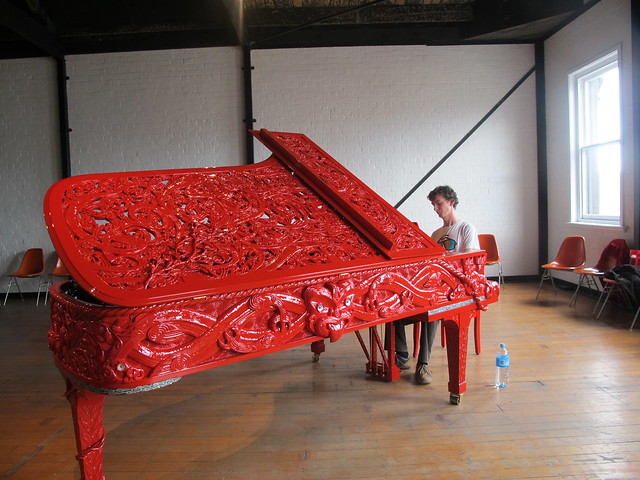Lili Kraus was possibly the greatest pianist ever to live in this country, and made a big impact on the musical world in New Zealand in the years after World War Two.
She was born in Budapest in 1903 in impoverished circumstances, but her mother was musical and she taught her piano from the age of 6. By the age of 8 she had entered the Royal Academy of Music there “creating a sensation with her audition”. Her tutors included three renowned musicians - Kodaly, Bartok and Schnabel. She became a teacher at the Vienna Academy by the age of 20 and embarked on a successful playing career.
Unfortunately her luck changed when she decided on a world tour at the beginning of the World War Two, and was caught by the Japanese invasion of Java. In 1943 she and her husband were arrested and sent to separate prison camps. Lili was sentenced to hard labour and lived in dreadful conditions. Nevertheless according to the LA Times she spent her time in the Japanese camp “studying piano masterpieces in her head, seeking new insights”. A Japanese conductor who had heard her play in Tokyo rescued her and she and her husband were transferred to a privileged camp in 1944, where she presumably received more than the two cups of rice per day that had she subsisted on previously. In 1945 they were freed and travelled to Australia and then New Zealand to recover.
A music teacher who was a student in Nelson at the time tells me that she spent her first six months in New Zealand in Queenstown regaining her strength, then settled in Nelson where a family of emigres from Vienna gave her and her family a home. Her son and daughter were settled into local schools and Lili concentrated on developing her repertoire, giving local and regional concerts. She also became patron of the Nelson School of Music with which she maintained a connection for the next 30 years. She apparently cut a flamboyant figure and my friend remembers that her favourite music was Schubert and Bartok - the latter a composer she was instrumental in introducing Nelson audiences.
Her concerts here were greatly treasured by the New Zealand musical community. An attendee at a recital in Christchurch told me how wonderful her interpretations of Schubert were - both her strength and charm shining through. He was delighted when a particularly strong finish to an impromptu was criticised by a local music critic, and she was able to point out that she had seen the original manuscript and the way she played it was the way it was written. I have a recording of her playing these impromptus and it is one of my treasured possessions.
Her tremendous strength reasserted itself and she was able to recover enough to begin touring again within a few years, starting with 120 concerts in 18 months! During the course of a successful career, she became known for her interpretations of Schubert, Mozart and Beethoven.
She eventually settled in America, where in the 60s the LA Times reports a critic as saying, the crowds "applauded like baseball fans who had just shared in winning the first game of the World Series"
Luckily for you I don't have to lend you my old LP, you can find her recordings on both Naxos Music Online and Music Online.
In an interesting aside, it is Lili's piano that was carved by Michael Parekowhai as part of On first looking into Chapman's Homer.
Piano, 2012. Flickr: CCL-2012-07-16IMG_5343
- Search DigitalNZ for Lili Kraus.
- Memories of Lili Kraus Christchurch Art Gallery
- Lili Kraus: Hungarian Pianist, Texas Teacher, Personality Extraordinaire by Steven Henry Roberson
- Response to a Vision: The First Hundred Years of the Nelson School of Music by Shirley Tunnicliff




Add a comment to: Lili Kraus – honoured guest of New Zealand